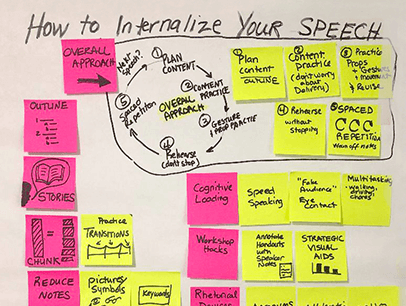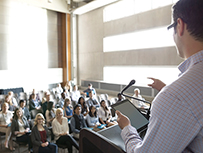
I have noticed a recent trend of speakers, particularly Toastmasters, reading their speech or presentation.
I get it. We are all busy. And it is easy to write our speech and then just read it right off our computer screen.
If your entire purpose is to simply stand up and speak, then okay. But if your goal is to improve your speaking skills and the effectiveness of your communication, then I would caution against it.
Recognize that, when I say that, it is not because I don’t do it myself. I am a professional reader. I do voice-over work for projects like corporate videos, commercials, and automated messages. I read scripts with the intent of communicating the writer’s message in a way that is compelling and natural. But I don’t read my speeches.
The first reason I caution against doing that is that most people aren’t good readers. Many sound just plain uninterested or bored. If your goal is to put your audience members to sleep, go for it. If you don’t want to risk doing that, don’t read it.
But what if you are a good reader? I still wouldn’t do it. One reason why reading is ineffective is that you are focused on the words, paying attention to what is coming next. This focus has the effect of diminishing your vocal variety. Which then diminishes your emotional connection with your audience. Vocal variety is the primary method through which we communicate and transfer emotion to our listeners. If you curtail this important feature, you limit the effectiveness and impact of your speech.
Don’t assume that you can just pick up a script and read it effectively.
Facial expressions are, frequently, the next to go. Zoom and other online formats are common these days. And for some clubs, they are standard. Body language is difficult in this medium. In my opinion, you can achieve far more by highlighting your facial expressions. But if you limit what your face can do because you are focused on reading, you are once again limiting what you can achieve with your speech.
There is a second drawback to reading. It trains us to not pay attention to our audience.
If your eyes are glued to a computer screen or piece of paper, how can they be focused on your audience members? And if you do it often, it can create a habit.
What difference does it make? Eye contact, first of all, tells your audience that you are thinking of them. It is a tool for them.
But it is also a tool for you. By looking at your audience, you find out if they are interested in what you have to say, confused by what you are saying, or have checked out completely. This gives you an opportunity to do a mid-course correction if you need to. If you are looking down, you lose that opportunity.
In addition, by looking at your audience members, you know who is really excited about what you have to say, and you can then focus on them. They are the ones who will carry your message to others when the speech is over.
Thus, the ability to use your eyes is critical.
There is yet another downside that reading your speech carries, especially if you are in a professional or corporate environment. It suggests that you are not all that familiar with your information. Is that the message you want to send to your potential clients or your corporate executives? I suspect not.
Granted, you don’t always have time to prepare for a speech. Sometimes you have to read. If you do, let me give you a couple of suggestions.
- Read my article “Reading a Prepared Text.” In it I describe how to mark up a text so you can deliver it naturally and with strong expression.
- Commit to developing the skill. There are times when you may want to read a speech in a live setting. I prefer to use a skeleton outline, but if you must read it word for word, make it a goal to become good at it.
Again, you may think you are a good reader, but most people are not. I have been a professional reader for over 30 years, and I am still improving my skill. Don’t assume that you can just pick up a script and read it effectively. When you read a script, you speak at your audience. Instead, seek to speak with them. Your speeches will be better for it.
Bill Brown, DTM is a speech delivery coach in Gillette, Wyoming. He is a member of Energy Capital Toastmasters in Gillette. Learn more at billbrownspeechcoach.com.
Related Articles

Presentation Skills
Ditch the Notecards

Presentation Skills
Speaking Without Notes

Presentation Skills



 Previous
Previous

 Previous Article
Previous Article